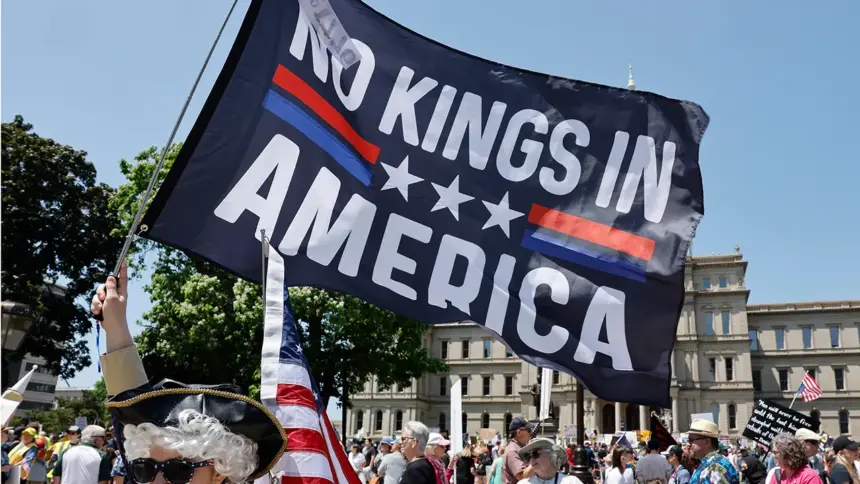On the morning of October 18, the United States awoke to a scene that seemed lifted not from the day’s news but from the pages of its own history. The streets of Washington, New York, Los Angeles, and Chicago were filled with millions of angry faces, waving flags, and chants echoing between skyscrapers: “No Kings.”
Three words that distilled a nation’s anxiety and summoned the spirit of the first cry Americans raised two and a half centuries ago against monarchy and tyranny.
This was not the first protest of its kind — but it was the largest and most resonant. Over seven million citizens poured into the streets in what newspapers called “the biggest protest against a sitting American president in history.” The second wave of outrage erupted following Donald Trump’s return to the White House in January 2025, transforming public squares into open tribunals. Many demonstrators believed that the man who had promised to make America great again was instead remoulding it in his own image — not in that of the Constitution.
In those cities where flags fluttered alongside placards, anger shared space with fear — fear that executive power might tip into absolute authority, and that presidential decrees could rise above accountability. Trump’s latest decisions had sparked widespread alarm: mass deportations of undocumented migrants, the deployment of National Guard units in urban centres, a partial government shutdown, and controversial revisions to voting and vaccine laws. To his critics, these moves represented not strength but a systematic erosion of democratic balance.
Amid this charged atmosphere, voices grew louder about the billionaire influence shaping American politics — figures like Elon Musk and Jeff Bezos, accused of standing closer to the corridors of power than to the marketplace. It was in this climate that the slogan “No Kings” was born — a symbolic rejection of the idea that wealth could reign where democracy should rule.
The coalition that organised the protests was not a single party but a mosaic of more than 200 progressive organisations, including the American Civil Liberties Union (ACLU), MoveOn, and Public Citizen. United by one conviction — that reminding both president and people of the republic’s founding principles is a civic duty that cannot wait — they dismissed Republican accusations of foreign funding, particularly from George Soros, with a sharp retort: “This is a volunteer uprising — purely by the people.”
In Washington, music merged with chants; in Chicago, Governor J.B. Pritzker addressed a crowd of a hundred thousand in defence of migrants and minorities; while in New York, thousands marched between glass towers carrying signs that read, “I pledge allegiance to no kings.” The mood was less a riot than a national festival of dissent — a blend of art, protest, and civic awakening. Celebrities such as Robert De Niro, Mark Ruffalo, Pedro Pascal, and Jon Bon Jovi lent their support, transforming the rallies into a cultural tableau of peaceful resistance.
Despite demonstrations spanning all fifty states, the day witnessed only isolated incidents of violence or vandalism. Police described the movement as “the largest peaceful protest in modern American history.” One officer told the press, “We’ve never seen this level of discipline in the midst of such collective anger.”
Trump responded with a mix of denial and mockery. From aboard Air Force One, he declared: “I’m not a king — I’m a president working day and night to make America great again.” Yet the words rang hollow after AI-generated videos surfaced depicting him as a monarch tossing rubbish at protesters — deepening criticism that he was toying with the image of power instead of honouring it.
Republican leaders sought to downplay the scale of the unrest, calling it “a leftist theatre of hate.” But observers saw the dismissive tone as an attempt to evade a harsher truth: that the American street is changing, and that growing segments of society now feel democracy itself is in peril. With the 2026 midterm elections approaching and an economy strained by inflation, unemployment, and inequality, few believe this public fury will fade quickly.
Political analysts described the movement as something deeper than protest. One noted that “‘No Kings’ is not a cry against Trump alone, but against the notion that the republic can be embodied in any single man or privileged circle.” Historian Heather Cox Richardson called the moment “a revival of the nation’s founding spirit,” recalling the revolutionaries’ refusal to kneel before absolute power — a reminder that freedom is never granted; it is claimed.
This American reckoning is not unique in history. Peoples across the world who reject the mentality of monarchy share a common instinct, whatever their geography. Just as Americans resist the notion of a throne rising above the republic, Moroccans once fought to preserve their political balance, affirming that monarchy is a symbolic framework, not an inherited dominion. Between Washington and Rabat runs a fine thread of civic awareness — the shared refusal to deify rulers and the conviction that national dignity cannot be bequeathed.
Though Trump still commands strong loyalty within his base, the vast mobilisations have exposed the depth of America’s divide — between those who see him as a saviour challenging obsolete institutions and those who view him as the greatest threat to the republican order. Between these two Americas lies a nation once more testing its founding premise: that power belongs to the people, and to them alone.
As night fell and the chants subsided, one phrase lingered in the crisp autumn air — “No Kings in the Land of the Free.” Perhaps that simple declaration will endure long after politics has quieted and slogans have faded, reminding the world that democracy, however shaken, never dies.
It rises — every time someone dares to sit upon its throne.
Dr. Hatem Sadek – Professor at Helwan University


